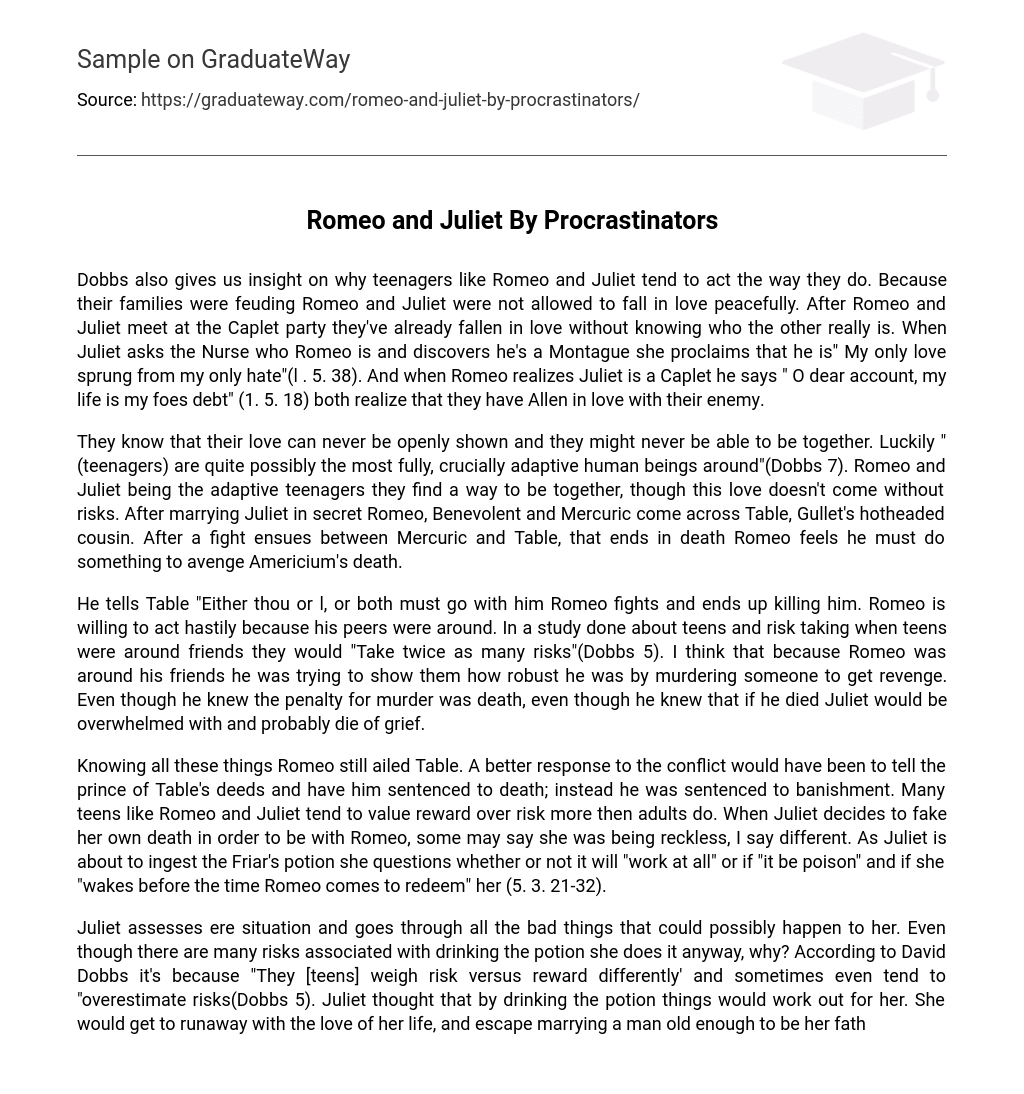Dobbs also gives us insight on why teenagers like Romeo and Juliet tend to act the way they do. Because their families were feuding Romeo and Juliet were not allowed to fall in love peacefully. After Romeo and Juliet meet at the Caplet party they’ve already fallen in love without knowing who the other really is. When Juliet asks the Nurse who Romeo is and discovers he’s a Montague she proclaims that he is” My only love sprung from my only hate”(l . 5. 38). And when Romeo realizes Juliet is a Caplet he says ” O dear account, my life is my foes debt” (1. 5. 18) both realize that they have Allen in love with their enemy.
They know that their love can never be openly shown and they might never be able to be together. Luckily ” (teenagers) are quite possibly the most fully, crucially adaptive human beings around”(Dobbs 7). Romeo and Juliet being the adaptive teenagers they find a way to be together, though this love doesn’t come without risks. After marrying Juliet in secret Romeo, Benevolent and Mercuric come across Table, Gullet’s hotheaded cousin. After a fight ensues between Mercuric and Table, that ends in death Romeo feels he must do something to avenge Americium’s death.
He tells Table “Either thou or l, or both must go with him Romeo fights and ends up killing him. Romeo is willing to act hastily because his peers were around. In a study done about teens and risk taking when teens were around friends they would “Take twice as many risks”(Dobbs 5). I think that because Romeo was around his friends he was trying to show them how robust he was by murdering someone to get revenge. Even though he knew the penalty for murder was death, even though he knew that if he died Juliet would be overwhelmed with and probably die of grief.
Knowing all these things Romeo still ailed Table. A better response to the conflict would have been to tell the prince of Table’s deeds and have him sentenced to death; instead he was sentenced to banishment. Many teens like Romeo and Juliet tend to value reward over risk more then adults do. When Juliet decides to fake her own death in order to be with Romeo, some may say she was being reckless, I say different. As Juliet is about to ingest the Friar’s potion she questions whether or not it will “work at all” or if “it be poison” and if she “wakes before the time Romeo comes to redeem” her (5. 3. 21-32).
Juliet assesses ere situation and goes through all the bad things that could possibly happen to her. Even though there are many risks associated with drinking the potion she does it anyway, why? According to David Dobbs it’s because “They [teens] weigh risk versus reward differently’ and sometimes even tend to “overestimate risks(Dobbs 5). Juliet thought that by drinking the potion things would work out for her. She would get to runaway with the love of her life, and escape marrying a man old enough to be her father whom she doesn’t even know. To Juliet Romeo was the reward that outweighed the risk of death.
Although much of they’re behavior is Justifiable with simple science and reasoning much of it goes to show that teens can’t handle risky situations all on their own, Romeos change from Rosalie to Juliet and Juliet considering suicide as an answer to their problems. The parents of Romeo and Juliet are almost completely absent in their child’s life. The only major interaction you see between them and their parents is when Juliet is telling her father that she doesn’t want to marry Paris and he reacts by insulting her calling her a “wretched puling fool… A whining mat”(3. 5. 186).





